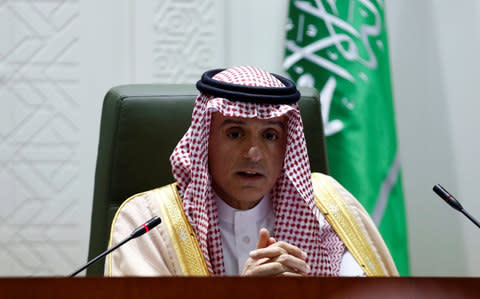Israeli general in unprecedented public offer to share intelligence with Saudi Arabia as alarm grows over Iran

Israel’s top military commander has given an unprecedented interview to a Saudi website, offering to share intelligence between the Jewish state and the Arab regional power in a joint effort to counter Iran.
Lieutenant General Gadi Eisenkot told the Saudi-owned Elaph news site that Saudi Arabia and Israel - two countries that do not have formal diplomatic relations - should work together in a “new international alliance” against Iran.
“We are ready to exchange experiences with moderate Arab countries and exchange intelligence to confront Iran,” the Israeli chief of staff said. “We are ready to share information if necessary. There are many common interests between us and them.”
The general’s words and his decision to grant the interview to an Arab outlet show the growing convergence between Saudi Arabia and Israel over their shared alarm at Iran’s influence in the Middle East.
Hours earlier, Saudi Arabia’s foreign minister Adel al-Jubeir lambasted both Iran and Hizbollah, the Lebanese militant group which is backed by Iran and seen as a mortal enemy by Israel.
“Hizbollah is a Grade A terrorist organisation,” Mr Jubeir said, in words which match Israel’s description of the group. “Whenever we see a problem, we see Hezbollah act as an arm or agent of Iran and this has to come to an end.”

The Elaph site is based in London and owned by Othman Al Omeir, a Saudi businessman known to be close to Saudi Arabia's King Salman.
The interview was conducted by an Israeli Druze journalist in Hebrew and then translated into Arabic, an Israeli military official said.
It was the first interview an Israeli chief of staff has given to an Arab outlet since 2005, when then commander Dan Halutz spoke to Al-Jazeera.
Gen Eisenkot said Israel had “no intention” of launching an attack on Hizbollah in southern Lebanon but also warned that he would not accept the group’s military build becoming “a strategic threat” to Israel.
Israel’s top military official Eisenkot: Tel Aviv ready to cooperate with #Riyadh 'to confront #Iran' pic.twitter.com/HnAD7RFkwL
— Press TV (@PressTV) November 16, 2017
He said he believed Iran was trying to establish dominance in the Middle East through two “Shia crescents” one from Iran, through Iraq and Syria to Lebanon, and a second from Bahrain to Yemen.
In the interview he stressed that while Israel and Saudi Arabia have never had diplomatic relations the two sides had never actually fought against each other.
Under the leadership of its aggressive young crown prince, Mohammed bin Salman, Saudi Arabia has tried to counter Iran across the region.
For the last two years it has been fighting in Yemen against the Houthi rebels, who are aligned with Iran, and recently accused Iran and Hizbollah of helping the Houthis to fire a missile at Riyadh’s airport.
Saudi Arabia has led a blockade against its neighbour Qatar, partly over the emirate’s ties with Iran, and many suspect Riyadh forced Saad Hariri, the Lebanese prime minister, to resign as a way of countering Hizbollah’s influence in the Lebanese government.

The Trump administration is eager to see Israel and Saudi Arabia, who are both American allies, work together against Iran. Gen Eisenkot said Donald Trump’s presidency created “an opportunity to build a new international coalition in the region”.
Saudi Arabia and Israel are unlikely to be able to establish full public diplomatic relations without a resolution of the Israeli-Palestinian conflict or at least significant progress. While Saudi Arabia’s leaders may be eager to cooperate with Israel, the Saudi public is strongly opposed to Israel and would likely react with anger to a deal that leaves out the Palestinians.
The right-wing government of Benjamin Netanyahu is unlikely to give the political concessions Saudi leaders would need to justify a public embrace of Israel.
“There is no way that an initiative that does not embarrass the hell out of the Saudis would not shatter Benjamin Netanyahu’s coalition, and perhaps even his Likud party, into pieces. It’s basically a binary, 'either/or' situation,” wrote Chemi Shalev, a columnist with Israel’s liberal Haaretz newspaper.
Egypt and Jordan are the only Arab countries with which Israel has diplomatic ties, although it cooperates secretly with other states in the region. Mr Netanyahu often speaks publicly of Israel's warming ties with "moderate Sunni states" but does not go into details.

